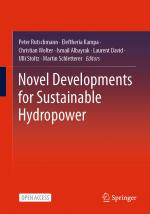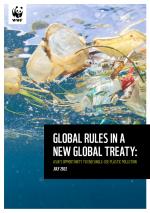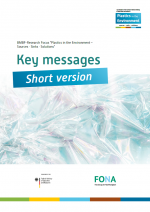Ecologic Institute Newsletter No 238 – July 2022
- Ecologic Institute Newsletter
Novel Developments for Sustainable Hydropower – Book
This open access book presents a selection of new and innovative developments for sustainable and fish-friendly hydropower. It offers unique insights into the challenges, practices, and policies surrounding hydropower developments across eight European countries, featuring examples drawn from on-site studies and Europe-wide analyses. The case studies throughout the book are practical "real-world" examples intended to serve as inspiration for anyone interested in learning more about designing and implementing solutions for achieving more sustainable hydropower generation. The book was co-edited by Ecologic Institute's Dr. Eleftheria Kampa. Experts from Ecologic Institute contributed to the chapters on "Policy Framework for Hydropower Mitigation" and "Public Acceptance of Hydropower."
Global Rules in a New Global Treaty: Asia's opportunity to end single-use plastic pollution – Report
In March 2022, at the resumed fifth session of the United Nations Environment Assembly, UN Member States made the historic decision to begin negotiations on a global treaty to combat plastic pollution. As national delegations and relevant stakeholders in Asia gear up for the upcoming negotiations, this report by Linda Mederake and Doris Knoblauch (both Ecologic Institute) aims to provide an analysis of the region’s opportunities to end single-use plastics (SUPs) pollution through the development of this new global treaty. The report is available for download.
Key Messages of the BMBF Research Focus "Plastics in the Environment" – Brochure
The brochure summarizes the key messages from all 20 joint research projects and the seven cross-cutting topics of the research focus. Structured by main topics, the central results are presented to derive recommendations for various target groups. Both the brochure and an abridged version in English are available for download.
A Fair and Solidarity-based EU Emissions Trading System for Buildings and Road Transport – Report
In this Ariadne publication, experts from Ecologic Institute, Potsdam Institute for Climate Impact Research, RWI – Leibniz Institute for Economic Research, Mercator Research Institute on Global Commons and Climate Change, Stiftung Umweltenergierecht, ZEW – Leibniz Centre for European Economic Research and IER Stuttgart analyzed various options for the relief and level of the CO2 price – and identified advantages and disadvantages as well as implementation requirements of different design options. The focus lies on two key political points of contention where scientific findings can prevent the imminent hardening of positions and thus promote a consensus conducive to climate protection. The report and a German summary are available for download.
Addressing Human Mobility in National Climate Policy – Policy Brief
This briefing paper, co-authored by Ecologic Institute's Natalia Burgos Cuevas, provides an overview of the ways in which the climate change–human mobility nexus has been accounted for in the Nationally Determined Contributions (NDCs) submitted thus far by South American countries and identifies pathways towards improved management of population movements in revised NDCs. The policy brief is available for download.
Conference on the Future of Europe. What is next for EU climate policies? – Document
In this Ecologic Institute paper, Deyana Spasova inquires how the third citizens' panel on climate change, the environment and health recommendations can improve EU climate policy. Where do the recommendations merely reiterate what is already in place? And how could the EU best translate the suggestions into policy action? The paper is available for download.
An Ultimate Form of Citizen Participation? – Article
Popular despite not being democratically elected: Citizens' Councils can strengthen public participation in the EU, but their importance must not be overstated. In this issue of the IPG Journal, Dr. Nils Meyer-Ohlendorf of Ecologic Institute discusses how Citizens' Councils can be involved in EU decision-making in the future. The article is available online.
Governability of Regional Challenges: The Arctic Development Paradox – Article
The article explores approaches applied by transregional organizations and cooperation programs that constitute the governance system in the European Arctic. Specifically, it scrutinizes governing interactions developed by the Barents Regional Council and the Northern Periphery and Arctic Programme to overcome the normative trap of the Arctic development paradox. Combined with a synoptic literature review, this article answers two questions: First, how do the transregional actors approach the Arctic development paradox in their cooperation strategies and programs, and to what extent do these approaches differ? Second, what kind of recommendations do they provide to overcome the Arctic development paradox? The article, to which Arne Riedel of Ecologic Institute contributed, is available online.
Mainstreaming Nature-based Solutions. Enhancing local policy coordination and coherence
On 4 July 2022, McKenna Davis from the Ecologic Institute spoke to the 2nd step of the UrbanByNature-methodology: Exploring existing urban greening policies, plans and regulations to identify gaps and understand local needs. Representing the CLEVER Cities project, McKenna Davis provided insights on how to ensure coherent and coordinated policymaking and align objectives across sectors and policies. She also highlighted relevant EU policies and initiatives supporting nature-based solutions to contextualize local action towards NBS mainstreaming. The presentation slides are available for download.
National Food System Dialogues: Increasing the plant-based share in our diets
On 22 June 2022, experts from various disciplines exchanged views on the transformation of the food system towards a more plant-based diet. More than 400 interested participants attended the event, which is part of the National Dialogue on Sustainable Food Systems in the context of the UN Food Systems Summit. In her keynote, Stephanie Wunder (Ecologic Institute) presented previous strategic approaches to food policy and instruments to promote plant-based diets at UN, EU, federal and state level, and derived lessons learned for the process of developing a nationwide food strategy. With Julia Jägle (Ecologic Institute) she prepared a strategy document on "Food Policy Strategies to Promote Plant-Based Diets in Germany", which is available for download (in German).
Researcher with Expertise in Climate Policy
To support our team in Berlin, we are looking – as soon as possible – for a Researcher with Expertise in Climate Policy. In a series of projects, Ecologic Institute is looking at the ways in which German and European climate policy can shape the transformation to climate neutrality and the framework conditions needed to achieve this. If this piques your interest, the climate team of the Ecologic Institute is looking forward to your application!
Event Manager (digital und in-person)
To support our Events Team in Berlin, we are looking – as soon as possible – for an Event Manager.
Apprenticeship as Event Management Assistant
For the next training year starting in September 2022, we are looking for a motivated and communicative trainee to become an Event Management Assistant. During your training, you will support our events team in organizing and staging scientific and political events, including national and international large-scale conferences, workshops and visiting programs.
Student Assistant in the Field of Data and Business Intelligence (compulsory internship possible)
As Student Assistant in the field of Data and Business Intelligence, you will support our Institute in the efficient development of a data architecture, the documentation of new approaches and the use of innovative technologies in the data environment. There is also the possibility of a compulsory internship.
Student Assistant in the Field of Internet Editing
Our internet editorial team coordinates the publication of information about our work to put the Institute's research results up for discussion, to give them attention and social relevance. It is responsible for the website ecologic.eu and the monthly Ecologic newsletter, and manages the Institute's social media channels. The Internet Editorial Team is part of our Communications Team, where Communications Manager, Visual Designer, Content Manager and Web Developer work together in an international team. To strengthen our team, we are looking for a student assistant.
Contents
- Publications
- Novel Developments for Sustainable Hydropower – Book
- Global Rules in a New Global Treaty: Asia's opportunity to end single-use plastic pollution – Report
- Key Messages of the BMBF Research Focus "Plastics in the Environment" – Brochure
- A Fair and Solidarity-based EU Emissions Trading System for Buildings and Road Transport – Report
- Addressing Human Mobility in National Climate Policy – Policy Brief
- Conference on the Future of Europe. What is next for EU climate policies? – Document
- An Ultimate Form of Citizen Participation? – Article
- Governability of Regional Challenges: The Arctic Development Paradox – Article
- Presentations
- Mainstreaming Nature-based Solutions. Enhancing local policy coordination and coherence
- National Food System Dialogues: Increasing the plant-based share in our diets
- We are Hiring!
- Researcher with Expertise in Climate Policy
- Event Manager (digital und in-person)
- Apprenticeship as Event Management Assistant
- Student Assistant in the Field of Data and Business Intelligence (compulsory internship possible)
- Student Assistant in the Field of Internet Editing


